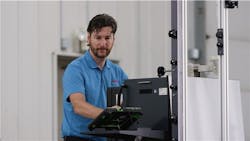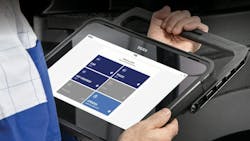Technician shortage got you down? Latest wave of diagnostic tools built to get you uptime
Key takeaways:
- Diagnostic tools can help technicians at understaffed shops make better use of their time
- Additionally, diagnostic technology can help less-experienced technicians catch up to their peers
- To achieve these, technicians need to know how to use the tools properly
Anyone working on modern commercial vehicles knows the greater amount of ECUs and sensors exponentially increases the volume of faults that can be triggered, and equally complex diagnostic tools must be used to troubleshoot whatever rolls into the shop.
At the same time, managers must contend with the technician shortage. Two-thirds of shops surveyed by American Transport Research Institute said they were understaffed, so those shops have to figure out how to do more with less.
“[The technician shortage] puts huge pressure on shops because they have to get more work done with a smaller team,” said Bruno Gattamorta, chief commercial officer for Cojali USA, adding that tools can help close the skills gap. “Modern tools, supported by customer support, training, technical information, and tailored fleet packages, enable less-experienced technicians to diagnose problems more accurately and with greater confidence.”
Step-by-step guided diagnostics and interactive wiring diagrams can give less-experienced technicians the confidence to tackle advanced systems. “Tools that are easy to navigate and offer guided diagnostic features can help entry-level technicians perform like their more experienced counterparts and reduce the burden caused by a shortage of qualified techs in the field,” said Jason Hedman, product manager at Noregon.
JPRO from Noregon’s Fault Guidance feature enables technicians to click on wires and trace them through the schematic or search within the diagram for specific sensors, relays, wires, and other labeled items.
Tools can also increase shop throughput and increase uptime, helping shops and fleets control costs. “The total cost of ownership for fleets has shot up by almost 40% since 2020. With aging fleets needing more frequent and precise repairs, these cost pressures are a major concern,” Gattamorta said.
However, even the best tools can only lead a technician so far. “A lot of people think you plug the laptop in and it tells you what is wrong with the truck, but that isn’t what happens,” explained Dan Carrano, vice president of fleet maintenance at A. Duie Pyle. “Without true knowledge of how systems work, you’re going to have a hard time diagnosing them. A lot of times, it will tell you to perform a test, and you have to know how to do it.”
Technicians also need to know how to use diagnostic tools properly. A. Duie Pyle developed video training in-house to teach techs how to use the various software programs the fleet uses. “Before we had the training, we had people who couldn’t navigate through,” Carrano said. “If you don’t know what you’re doing, you can cause more harm than good. It is so easy to create some damage that may not rear its ugly head at the moment but will be problematic down the road.”
A. Duie Pyle has also created a fleet tech help desk within the maintenance department. “If a technician has his laptop hooked up to a truck, is going through the diagnostic procedures and gets stuck, our trainers can jump on the fleet tech’s laptop, see what he’s doing and coach him through the diagnostic programs,” Carrano said.
For Joe LeMieux, operations manager for Equipment Experts, one of the benefits of tools and software that can be used for multiple makes and models is that the format is the same so technicians don’t have to learn numerous programs.
“If you were to use Ford-specific software on a Ford vehicle, their software is laid out their own way. Cummins, Detroit, and Allison all have their own platforms,” he explained. “Whereas if you’re connecting with the Diesel Laptop or JPRO, the navigation is going to be the same no matter what you’re connecting to.”
According to Kristy Coffman, director of the commercial vehicle group at Mitchell 1, training is essential. “You can’t just buy something and say, ‘Here’s this pretty new toy. Isn’t it cool?’ If it just sits on the shelf, it’s not doing anybody any good,” she said. “If you encourage them to utilize the new tool or a new process, you’re going to see the ROI.”
Creating a seamless technician experience is a top priority for many technology providers. “Being able to create consistency amongst all brands is one of the reasons why we do what we do, because it is less work for the technician to have to learn and navigate just finding the repair information,” Coffman said.
Several providers said they’re working to increase tool knowledge before techs even enter the workforce. TEXA equips technicians with tools in the early stages of their training and provides access to advanced levels of shop-level training through the TEXA EDU program, White said.
TEXA also has a video library to address specific questions and offers support teams that can connect to a registered TEXA tool in the field while connected to a vehicle to explain how to navigate the software features or perform activations, adjustments or maintenance resets.
Noregon’s Education Program works with 150 schools to provide training materials and access to diagnostic and repair tools. The company provides on-site training when shops purchase tools and offers a JPRO Certification Program, where technicians who achieve a test score of 70% or higher receive a diploma and a JPRO uniform patch.
If technicians require additional support, Noregon offers a Technician as a Service (TaaS) program that provides remote assistance from master mechanics. “This gives newer techs the assistance to solve issues without pulling away their more experienced coworkers so a shop can remain at peak efficiency,” Hedman said.
Cojali also provides onboarding sessions, virtual training, tutorial videos, and weekly training and Q&A sessions, along with optional services where diesel expert technicians offer step-by-step guidance.

